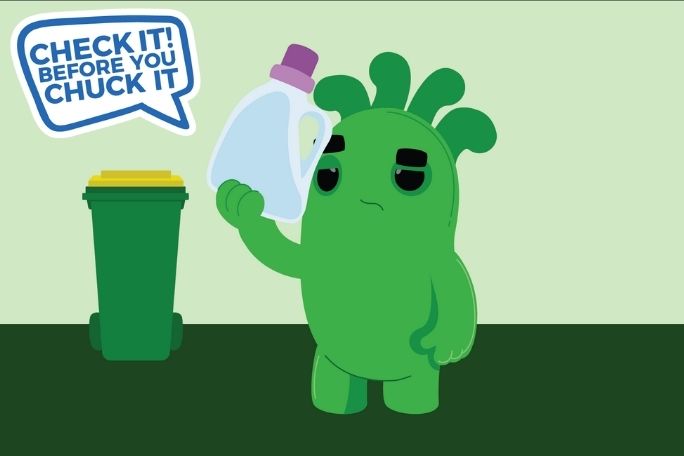Lesson summary
Coming to you live from the studio! In this lesson students will reflect on their learning across this unit, reinforcing the ideas and topics covered, revisiting topics and uncovering any gaps in understanding. Students will then take on the roles of reporters for a nightly news program, researching, writing and presenting their findings on various aspects of the Australasian Recycling Label (ARL), recycling and environmentalism.
Learning intentions:
Students will...
- demonstrate an understanding of the ARL, recycling and sustainability concepts.
Success criteria:
Students can...
- use specific details from their research to support their point of view
- choose language features and images to support their point of view
- contribute actively to class and group discussions taking into account other perspectives.
Lesson guides and printables
Lesson details
Curriculum mapping
Australian Curriculum content descriptions:
Year 5 English:
- Plan, draft and publish imaginative, informative and persuasive print and multimodal texts, choosing text structures, language features, images and sound appropriate to purpose and audience (ACELY1704)
- Use comprehension strategies to analyse information, integrating and linking ideas from a variety of print and digital sources (ACELY1703)
Year 6 English:
- Plan, draft and publish imaginative, informative and persuasive texts, choosing and experimenting with text structures, language features, images and digital resources appropriate to purpose and audience (ACELY1714 )
- Use comprehension strategies to interpret and analyse information and ideas, comparing content from a variety of textual sources including media and digital texts (ACELY1713 )
Year 5 Science:
- Scientific knowledge is used to solve problems and inform personal and community decisions (ACSHE100)
Year 6 Science:
- Scientific knowledge is used to solve problems and inform personal and community decisions (ACSHE083)
Syllabus outcomes: EN3-2A, EN3-3A, ST3-7PW
General capabilities: Literacy, Information and Communication Technology (ICT) Capability, Critical and Creative Thinking, Personal and Social Capability, Ethical Understanding.
Cross-curriculum priority: Sustainability
Relevant parts of Year 5 English achievement standards: Students listen and ask questions to clarify content. They use language features to show how ideas can be extended. Students develop and explain a point of view about a text, selecting information, ideas and images from a range of resources. They create imaginative, informative and persuasive texts for different purposes and audiences. Students make presentations which include multimodal elements for defined purposes. They contribute actively to class and group discussions, taking into account other perspectives.
Relevant parts of Year 6 English achievement standards: Students listen to discussions, clarifying content and challenging others’ ideas. They understand how language features and language patterns can be used for emphasis. Students show how specific details can be used to support a point of view. They explain how their choices of language features and images are used. Students create detailed texts elaborating on key ideas for a range of purposes and audiences. They make presentations and contribute actively to class and group discussions, using a variety of strategies for effect.
Relevant parts of Year 5 Science achievement standards: Students discuss how scientific developments have affected people’s lives, help us solve problems and how science knowledge develops from many people’s contributions.
Relevant parts of Year 6 Science achievement standards: Students explain how scientific knowledge helps us to solve problems and inform decisions and identify historical contributions.
This lesson is part of the wider unit of work Australasian Recycling Label
Time required: 120+ mins
Level of teacher scaffolding: Medium – support students with research, writing, ICT, and social skills as students work independently to create content and deliver presentations
Resources required
- A block coloured backdrop, preferably green, although a curtain or wall will suffice so long as it is one complete colour and flat
- Costumes or props for filming – optional
- A device capable of presenting a video to the class
- A device capable of recording video
- A green screen app such as Do Ink uploaded to devices
Skills
This lesson is designed to build students’ competencies in the following skills:
- Communication
- Community engagement
- Creativity
- Digital literacy
- Global citizenship
- Leadership
- Problem solving
- Social skills
- Collaboration
Additional info
This lesson has been developed as part of Planet Ark’s campaign around the Australasian Recycling Label and sustainable packaging. You can get involved during Planet Ark’s National Recycling Week or at any time during the school year and join thousands of amazing teachers in making a difference and creating positive environmental change. If you use any of these lessons, we highly recommend you submit an entry for the School’s Recycle Right Challenge in Term 4 and enter in the draw to win amazing prizes for your school!


Welcome back!
Don't have an account yet?
Log in with:
By signing up to Cool.org you consent and agree to Cool's privacy policy to
store, manage and process your personal information. To read more, please see
our privacy policy here(Opens in new tab).
Create your free Cool.org account.
Many of our resources are free, with an option to upgrade to Cool+ for premium content.
Already have an account?
Sign up with:
By signing up to Cool.org you consent and agree to Cool's privacy policy to
store, manage and process your personal information. To read more, please see
our privacy policy here(Opens in new tab).